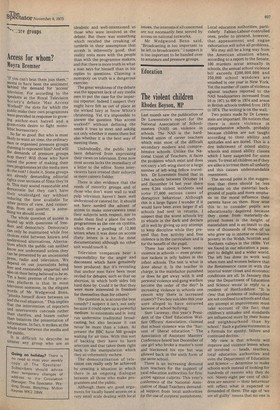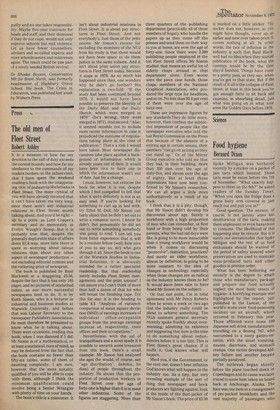Education
The violent children
Rhodes Boyson, MP
Last month saw the publication of Dr Lowenstein's report for the National Association of Schoolmasters (NAS) on violence in schools. The NAS is the hardheaded union of career teachers which man most of the difficult secondary modern and comprehensive schools. Unlike the National Union of Teachers, it faces the problems which exist and does not carry a left-wing slant or a large number of left-wing fellow travellers. Dr Lowestein found that in 1,844 schools between October 14 and December 14 last year there were 6.344 violent incidents and some 37,000 serious cases of disruptive behaviour. Although this is a large figure I wonder if it would have been even larger if all schools had sent in returns. I suspect that the worst schools try to whistle in the dark and declare all is well by giving up any attempt to keep discipline while they pretend that free activity and free violence is in the curriculum and is for the benefit of the pupil.
There has always been some violence in schools — even protection rackets in jelly babies in the infant schools. The test is what is done about it. Is the teacher in charge, is the malefactor punished or does he get away with it and personal violence and gang warfare become the order of the day? Is increasing violence in schools one reason why there is increased truancy? Two boy suicides this year were alleged to have occurred because of school bullying.
Sam Laraway, this year's President of the Chief Education Welfare Officers' Association, claimed that school violence was the "harvest of liberal education." The Association of Assistant Masters' Conference heard last December of one girl who broke a master's nose and blackened his eye but was allowed back in the sixth form of the same school, There is an increasing demand from teachers for the support of local education authorities for firm action against culprits. This year's conference of the National Association of Head Teachers demanded support from local authorities for the use of corporal punishment. Local education authorities, particularly Fabian-Labour-controlled ones, prefer to pretend, however, that appeasement and vague exhortation will solve all problems.
We may still be a long way from the American situation where, according to a report to the Senate, 100 murders occur annually in schools, the annual school violence bill exceeds £200,000,000 and 250,000 school windows are smashed in one year in New York. Yet the number Of cases of violence against teachers reported to the NAS headquarters increased from 10 in 1971 to 600 in 1974 and arson in British schools trebled from 1972 to 1974. The writing is on the wall.
Two points made by Dr Lowenstein are important. He notices that there is more violence in comprehensive schools, probably because children are not taught according to their ability and aptitudes and are bored. This is a dire indictment of mixed ability schools and mixed ability classes which I have suspected for some years. To treat all children as if they are alike is to treat them all unfairly and this causes understandable resentment.
The second point is the suggestion that there should be less emphasis on the material background of pupils and more emphasis on the moral influence their parents have on them. How wise this is: to consider pupils are educationally deprived because they come from materially-deprived homes is the height of materialism and is an insult to the tens of thousands of those of us who grew up in intense or relative poverty in the Welsh, Scottish and Northern valleys in the 1930s. Yet we found in our education a passport to delight and a wider world. The left has done its work well when men and women believe that the Renaissance came in with the internal water closet and economic conditions are all. In January this year the Department of Education and Science wrote in reply to a resident of Hertfordshire: "It is clear that problems of indiscipline are not confined to schools and that any attempt at improvement must take account of the fact that children's attitudes and standards are influenced more by their home and neighbourhood than by school." Such a gutless statement is a formula for apathy, failure and continued decline.
My view is that schools will improve and violence lessen when all involved — heads, teachers, local education authorities and even the Department of Education and Science — determine to make schools work instead of looking for hundreds of reasons why they do not. Ninety-eight per cent of children are neutral — their behaviour will reflect what is expected or demanded of them. The age of 'we are all guilty' means that no one is guilty and no one takes responsibility. Maybe five-year contracts for heads and staff, and their dismissal if they do not cope, would not only improve schools but end violence. Let us have fewer counsellors, advisers and so-called experts and more schoolmasters and mistresses again. The result could be one part of a sorely needed British revival.
Dr Rhodes Boyson, Conservative MP for Brent North, was formerly headmaster of Highbury Grove School. His book, The Crisis in Education, was published last week by Woburn Press

































 Previous page
Previous page